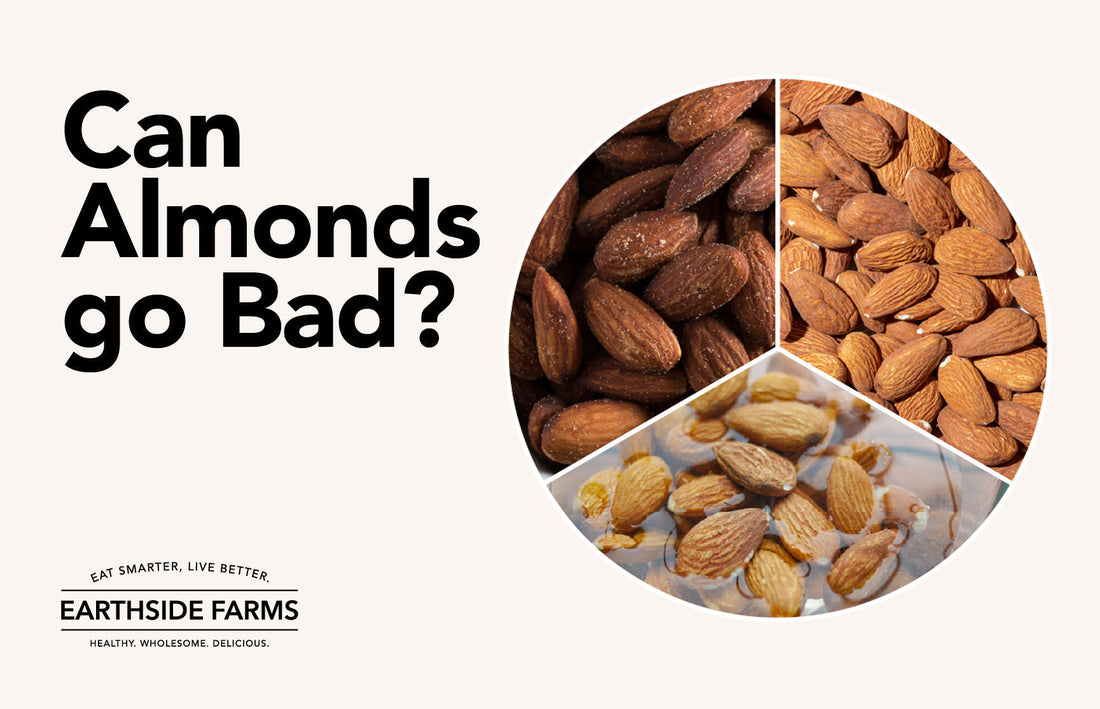Almonds are packed with nutrients, minerals and vitamins which makes them a great addition to any diet. Like any other food item, almonds also have a shelf life and can spoil over time.
Do Almonds Expire?
Yes, almonds do expire, but their shelf life depends on how they are stored. Raw almonds and roasted almonds all have different storage times. Generally, raw almonds last longer than roasted almonds.
Shelf Life of Almonds:
The shelf life of almonds varies depending on the type:
-
Raw almonds: Can last up to two years if stored properly in a cool, dry place.
-
Roasted almonds: Typically last six months to one year since they undergo heat processing, which can cause the oils to go bad faster.
-
Flavored almonds: Have a shorter shelf life, usually around six months, due to added ingredients that may spoil over time.
Signs that Tell If Almonds Have Gone Bad:
Almonds do not spoil in the same way as fresh fruits or vegetables, but they can become rancid, moldy, or stale. Here are some common signs that almonds have gone bad:
-
Unpleasant Smell: Fresh almonds have a mild, nutty aroma. If your almonds smell sour, musty, or like paint or chemicals, they have likely gone rancid.
-
Bitter or Sour Taste: A fresh almond should taste slightly sweet and nutty. If it tastes bitter or sour, it is no longer beneficial to eat.
-
Change in Texture: Bad almonds may feel softer, oilier, or too dry. They may also have a sticky or slimy texture.
-
Mold Growth: If you notice white, blue, or green spots on your almonds, this means mold has started growing, and they should be thrown away immediately.
-
Presence of Bugs: Sometimes, improper storage can attract insects or pests. If you see any bugs in your almonds, it’s best to discard them.
How to Store Almonds Properly?
-
Store in an Airtight Container: Keep almonds in an airtight container to prevent them from absorbing moisture and odors from other foods.
-
Keep in a Cool, Dark Place: Heat and light can cause almonds to spoil faster. Store them in a pantry, cupboard, or drawer away from direct sunlight.
-
Refrigerate or Freeze for Longer Shelf Life: If you want to extend the shelf life, store almonds in the refrigerator for up to two years or in the freezer for up to three years. Always use a sealed bag or container to prevent freezer burn.
-
Use Vacuum-Sealed Bags: For the longest shelf life, vacuum-sealing almonds before freezing can help keep them fresh by removing excess air.
-
Keep Away from Moisture: Moisture can cause mold growth, so always store almonds in a dry place and avoid leaving them open to humid air.
Can One Eat Stale Almonds?
Stale almonds may not taste as good as fresh ones, but they are generally safe to eat if they do not have any mold, rancid smell, or bitter taste. If your almonds taste stale but are not spoiled, you can try roasting them to bring back some of their original crunch and flavor. Eating a few expired almonds may not cause serious harm, but consuming rancid almonds regularly can lead to digestive problems, such as diarrhea or stomach pain.
How to Make Stale Almonds Crunchy Again?

If your almonds have lost their crunch but are not spoiled, you can try these methods to freshen them up:
-
Roasting - Spread the almonds on a baking sheet and bake at 350°F (175°C) for 10-15 minutes. This helps bring back some flavor and crispiness.
-
Toasting on the Stovetop - Heat a pan on low heat and toast the almonds for a few minutes while stirring continuously. No need to add any oil either!
-
Using in Recipes - You can use them in baking, smoothies, or granola where texture is less important.
Can Soaked Almonds Go Bad?
Soaking almonds is common to make them easier to digest and enhance their nutritional benefits. However, soaked almonds can spoil quickly if not stored properly.
To prevent this:
-
Soak only for 8-12 hours and then drain the water.
-
Refrigerate soaked almonds in an airtight container and consume within two days.
-
Do not leave soaked almonds at room temperature for too long, as they can grow mold or develop an off smell.
Enjoy the Crunch!
Almonds can go bad, but with proper storage, you can extend their shelf life significantly. Always check for signs of spoilage before eating almonds, and store them in a cool, dry place to keep them fresh. If you have almonds that taste stale but are not spoiled, roasting them can help to bring back their original crunch. Whether you eat them raw, roasted, or soaked, keeping your almonds fresh will ensure that you enjoy their health benefits.
Earthside Farms’ Orange Ginger Almonds:
If you love flavored almonds, you might want to try Orange Ginger Almonds. These almonds are infused with a delicious combination of zesty orange and spicy ginger, offering a unique twist to traditional almond flavors.


